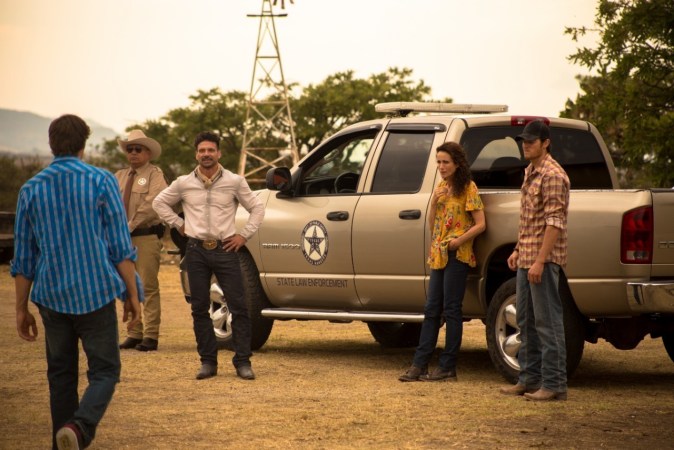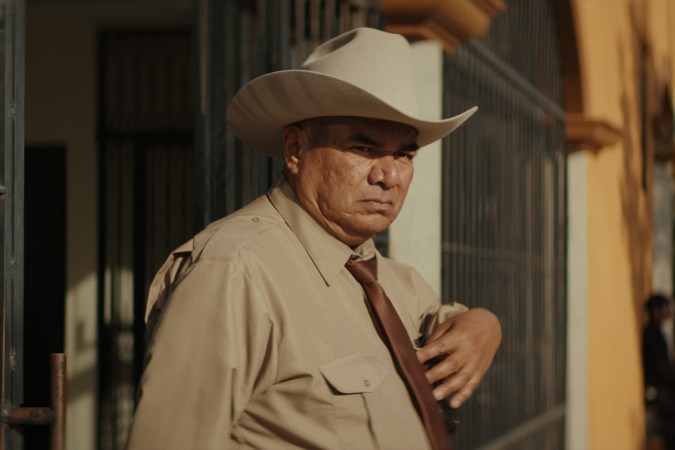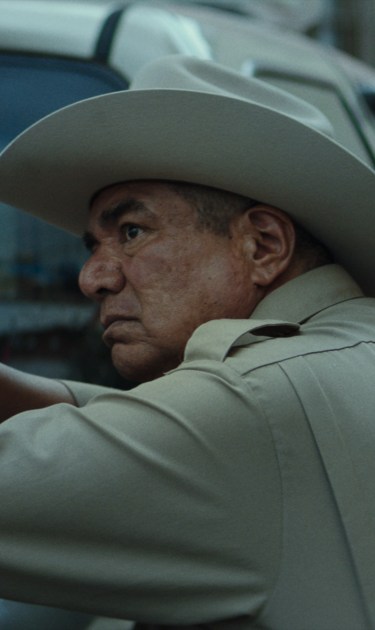For the last two decades, comedian George Lopez has been known for making millions of people laugh on TV sitcoms like his namesake series and animated movies like The Smurfs and Rio, but the original Latin King of Comedy has made a conscious decision over the last few years to do things a bit different.
Now, Lopez, 59, is open to more dramatic roles. Early on in his acting career, he played an abusive boss on Bread and Roses, director Ken Loach’s drama about janitorial workers in Los Angeles who fought for better working conditions. The film was then nominated for the Palme d’Or at the Cannes Film Festival in 2000. Later in his career, he played a Phoenix high school teacher in the 2015 drama Spare Parts. The true story followed a group of Latino students who go on to win a major engineering competition.
Still, it wasn’t until around 2018 when Lopez’s dramatic choices started becoming the rule and not the exception. From a vengeful father in River Runs Red to an LAPD captain in El Chicano to a member of the Mexican mafia in The Tax Collector, there’s nothing funny about the roles Lopez has been attracted to for the last few years.
The former late-night host continues his streak of playing serious characters with No Man’s Land. The western drama tells the story of a young man on the U.S./Mexico border who accidentally kills an immigrant boy who is traveling to the United States with his family. With blood on his hands, the man crosses into Mexico to escape his inevitable arrest. Lopez plays a Texas Ranger who begins to track the fugitive, so he can bring him to justice.
During an interview with Remezcla, Lopez talks taking on more serious roles, what he thinks about drug cartel movies, the term “Latinx” and more.
No Man’s Land hit theaters and VOD platforms on January 22.
Have these recent dramatic roles you’ve been accepting been a conscious decision on your part to do something different?
It’s conscious. I knew about Spare Parts, but I wasn’t really looking to be in it. When it started getting more steam, they asked me if I wanted to be the teacher in it. It was a very dramatic role. I wasn’t in the whole film. When I started to do dramatic work, I thought it would be better to take something a little bit smaller to get my feet [on the ground].
I didn’t get here by listening to other people. I didn’t get here by wanting everybody to like me.
Has trying more dramatic work worked for you as someone known more for his comedy?
You know, whatever is going on politically and whatever is going on in people’s hearts, people have such disdain for me and my views and for my comedy. [Making different choices] reminds you to be you. I didn’t get here by listening to other people. I didn’t get here by wanting everybody to like me. Maybe the people you’re around aren’t so excited that you’re doing this, but you know how hard it is to get it done. [No Man’s Land] meant something to me. I’m doing it because I thought it was a good story.
These days, if a studio is making a movie or TV show set on the border, it’s usually going to feature a story about drug cartels. What do you think about the genre and how popular it has become since Breaking Bad?
You’d hate to think you have to be the Night Stalker to trend on Netflix. There are wonderful actors in [the Narcos franchise]. Michael Peña is a wonderful actor [in Narcos: Mexico]. [Pedro Pascal] is incredible [in Narcos]. [No Man’s Land actor] Jorge [Jimenez] was in Narcos. I used to be the toughest on projects like that. But it’s not invisible and not made up. I think when something is real, that’s what films have always tried to do—to bring a reality to the work.

Do you think if you had been given more opportunities to do dramatic work as a young actor, you would’ve accepted roles as the cholo or gangster just to get your foot in the door?
You know, when [the TV crime series] Hunter was on NBC [in the 1980s], there was a role on the show [to play] an illegal alien who steals a car, and they find a body in the truck. At the time, I didn’t have my SAG (Screen Actors Guild) card.
I remember the guy who represented me [said], “They want you to go here tomorrow for wardrobe.” I’m like, “I’m not doing this.” He was like, “Hey, man, you don’t have to read for it. They gave it to you.” I was like, “I don’t want it.” He was like, “But you’ll get in the union.” I was like, “I don’t want to get in the union like this.”
Back then, consciously, I didn’t do those things. I was a guy who had principles and beliefs when nobody gave a shit what my principles and beliefs were. I had managers yelling at me. They couldn’t get me to change my mind. I turned a ton of stuff down.
You didn’t turn down No Man’s Land. Why?
I know how difficult it is to get a movie like this made. It wouldn’t have been made if Latinos had done it. You look at the rancher characters [played by] Frank Grillo and Andie MacDowell and [Andie’s character] says, “What happened to us?” because they used to have compassion towards people. When did we become these people? That’s a good question for everybody.
Latinos were vilified by the last administration for four years, which led to things like the massacre in El Paso two years ago. Do you think Hollywood has a responsibility to reshape how audiences see Latinos? Or are movies just movies?
Hollywood doesn’t give a f**k about how we’re viewed. As a town, they couldn’t give a shit. Those diversity reports have come out and we’re the least represented. You know, I went to El Paso. Donald Trump went and took a picture with a baby and met one guy. Nobody wanted to talk to him. There was a responsibility there. I decided that I was going to go.
Hollywood doesn’t give a f**k about how we’re viewed.
I didn’t bring cameras with me. I brought Edward [James] Olmos. We went and talked to every person, every police officer, every doctor and thanked them. I didn’t do it for attention. I did it because as a high-level guy, I wanted to show my face and show my respect. As I stood there in that half-mile line of candles and flowers, not one of those messages was negative.
Nobody’s really going to take the time to understand the Latino culture, the Mexican culture, but we don’t hate people. If you don’t hate after [the shooting], it tells you something about the people. I didn’t see a line of Latino performers in front of me to go to El Paso either, so I did what I felt was right.

Time for a quick lightning round of questions: Do you care that Javier Bardem is going to play Desi Arnaz?
Do I care that Nicole Kidman is going to play Lucille Ball? I do, but what am I going to do? When Meryl Streep played a [Chilean in The House of the Spirits] and Walter Beery played Mexican [in Viva Villa!] and Marlon Brando played Zapata [in Viva Zapata!], it’s just the way it is.
What do you think about the fact that there have been a few Latino actors over the last year who have decided to change their stage names to something that represents them as Latinos? So, James Roday (TV’s Psych) went back to James Roday Rodriguez and Isabel Moner (Dora and the Lost City of Gold) took her grandmother’s last name and became Isabela Merced.
Changing people’s names in Hollywood is not something that’s new. I respect them for going back. That’s not easy. I don’t think that happens a lot. You know, Linda Ronstadt wasn’t Mexican when she was thin, but later when she started putting on a little bit of weight it was like, “You’re a little bit bigger than you were last time.” She was like, “Well, I’m Mexican. Didn’t I tell you?”
Why does the word “Latinx” trigger people so much?
We don’t have a term that has solid ground—Hispanic, Latino, Latinx. It’s almost like whichever way the wind blows, then people don’t respect it because they’re like, “How do you have a new identity when we’re still trying to forge our original identity?” But if it helps young people to be proud of who they are and to not run from it, I’m in support of it. If it sticks, I’ll support it. But I think people look at [Latinos] as one community and we’re not. We’re individuals. Steven Spielberg doesn’t have to make Ron Howard proud. They just get a chance to work. Somehow, we’re all tied and put together by our culture. That’s what is ultimately unfair to Latinos.
People look at [Latinos] as one community and we’re not. We’re individuals.
What are your thoughts on the attack at the U.S. Capitol earlier this month?
We haven’t seen shit like that in over 200 years. I’m so glad that the only Latino there was selling hotdogs and water and some sodas. We have to let the dust settle and go back to having one America and not five or six like we have right now.
Well, hopefully, we don’t have to hear Trump’s name ever again.
I don’t think he’ll have a day of peace when he gets out. Like I say, it’s not shoplifting until you leave the store. So, he’s been protected these last four years. When he leaves the store, they’re going to be like, “Excuse me. We’re going to need to talk to you.”




